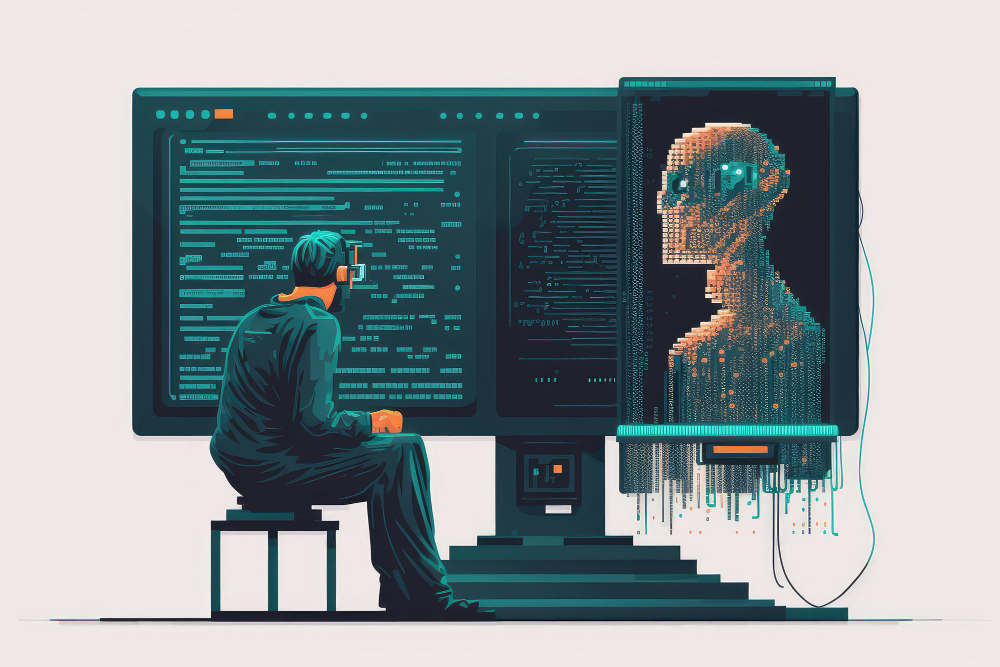Latest Trends in Artificial Intelligence: What to Expect in the Coming Years
Artificial intelligence (AI) has rapidly evolved over the past decade, and the coming years are expected to bring even more exciting advancements. From machine learning to natural language processing, AI technologies are transforming various industries and revolutionizing the way we live and work. In this article, we will delve into the latest trends in artificial intelligence and explore what we can expect in the near future.
One of the most significant trends is the rise of AI in healthcare. With the ability to analyze vast amounts of medical data, AI algorithms are enhancing diagnostic accuracy, drug discovery, and even robotic surgeries. Additionally, AI-powered virtual assistants are becoming more prevalent, improving customer service and streamlining business operations.
Another growing trend is the adoption of AI in self-driving cars. Companies like Tesla and Google are making significant strides in autonomous vehicle technology, making roads safer and reducing traffic congestion. Moreover, AI is also being integrated into smart homes, enabling voice-controlled assistants to handle everyday tasks and providing personalized experiences.
As AI continues to advance, the possibilities are endless. From improved cybersecurity to personalized education, the future of artificial intelligence looks promising. Stay tuned to learn more about the latest developments in this fascinating field.
Importance of staying updated with AI trends
Staying updated with the latest trends in artificial intelligence is crucial in today’s fast-paced world. As AI continues to evolve, new applications and technologies emerge, impacting various aspects of our lives. Whether you’re a business owner, a technology enthusiast, or just curious about the future, understanding AI trends will give you a competitive edge and help you make informed decisions. By staying up-to-date, you can harness the power of AI to drive innovation, improve efficiency, and create new opportunities.
The field of artificial intelligence is constantly evolving, with breakthroughs and advancements happening at a rapid pace. By staying updated with AI trends, you can stay ahead of the curve and leverage the latest tools and technologies. Whether it’s understanding the latest machine learning algorithms or exploring new applications of natural language processing, staying informed will enable you to embrace the potential of AI and unlock its benefits for your business or personal life.
Moreover, staying updated with AI trends allows you to anticipate future developments and prepare for upcoming changes. As AI becomes more integrated into our daily lives, it’s important to understand the potential impact on jobs, industries, and society as a whole. By staying informed, you can adapt to these changes and ensure a smooth transition into the AI-driven future.

Artificial intelligence in web development
The future prospects of artificial intelligence (AI) in web development are promising and continue to evolve rapidly. AI is already making a significant impact in various aspects of web development, and this trend is likely to continue and expand. Here are some key areas where AI is expected to play a crucial role in the future of web development:
- Personalization: AI can help create highly personalized web experiences. By analyzing user behaviour and preferences, AI can recommend content, products, and services tailored to individual users, enhancing user engagement and satisfaction.
- Chatbots and Virtual Assistants: AI-powered chatbots and virtual assistants are becoming more sophisticated. They can provide instant customer support, answer user queries, and improve user interaction on websites.
- Content Generation: AI can automate content creation, such as generating product descriptions, blog posts, and news articles. While AI-generated content may not replace human content creators entirely, it can be a valuable tool for generating large volumes of content quickly.
- User Experience (UX) Enhancement: AI can analyze user behaviour to optimize website layouts, navigation, and design for improved user experience. It can also identify and fix usability issues.
- Search and Recommendation Engines: AI-powered search engines can provide more accurate and relevant search results, while recommendation engines can suggest products, content, or services based on user preferences.
- Security: AI can help enhance website security by detecting and preventing cyber threats, such as malware, DDoS attacks, and data breaches. It can also identify anomalies in user behaviour that may indicate fraudulent activities.
- Automation: AI can automate repetitive and time-consuming tasks in web development, such as code generation, testing, and deployment. This can lead to faster development cycles and reduced human errors.
- A/B Testing and Optimization: AI can continuously analyze user interactions and perform A/B testing to determine the most effective website elements, helping businesses optimize their websites for conversions and engagement.
- Voice and Image Recognition: With the growing use of voice-activated devices and visual search, AI technologies like natural language processing and computer vision will become essential for web developers to create voice and image-friendly interfaces.
- Accessibility: AI can be used to improve web accessibility by automatically generating alt text for images, providing real-time captioning for videos, and making websites more inclusive for people with disabilities.
- Predictive Analytics: AI can help businesses make data-driven decisions by providing insights into user behavior, traffic patterns, and sales forecasts, allowing them to adjust their strategies accordingly.
- Content Curation: AI can assist in curating and organizing content by tagging, categorizing, and recommending relevant content to users based on their preferences and interests.
While the future of AI in web development is bright, it’s essential to consider the ethical and privacy implications of using AI in this context. As AI continues to advance, web developers, businesses, and regulatory bodies will need to address these concerns and ensure responsible and transparent AI implementations. Staying up-to-date with the latest AI technologies and their applications in web development will be crucial for professionals in this field.
Current state of artificial intelligence
The current state of artificial intelligence is marked by significant advancements and widespread adoption across various industries. Machine learning, a subset of AI, has become a dominant force, powering applications such as image recognition, natural language processing, and recommendation systems. Companies like Google, Amazon, and Facebook have been at the forefront of AI research and development, leveraging vast amounts of data to train powerful AI models.
Another key aspect of the current AI landscape is the rise of virtual assistants. From Apple’s Siri to Amazon’s Alexa, these AI-powered virtual assistants have become an integral part of our daily lives. They can perform tasks like setting reminders, answering questions, and even controlling smart home devices. As natural language processing and voice recognition technologies improve, virtual assistants are becoming more intelligent and capable of understanding complex commands.
Furthermore, robotics and automation are playing a significant role in the current state of AI. Robots are being used in industries like manufacturing, healthcare, and logistics to perform repetitive or dangerous tasks. With advancements in robotics, these machines are becoming more sophisticated, enabling them to handle complex operations and work alongside humans in collaborative environments.
Key trends in AI for the coming years
Looking ahead, several key trends are expected to shape the future of artificial intelligence. These trends encompass various aspects of AI, including machine learning, natural language processing, robotics, and ethical considerations. Let’s explore some of these trends in more detail.
Machine Learning Advancements and Applications
Machine learning, a subset of AI that focuses on algorithms and statistical models, is expected to see significant advancements in the coming years. With the exponential growth of data, machine learning models can be trained to make more accurate predictions and automate complex tasks. Deep learning, a subfield of machine learning, has shown remarkable success in areas such as computer vision, speech recognition, and natural language understanding.
In addition to improving accuracy, machine learning is finding applications in diverse industries. In healthcare, machine learning algorithms can analyze medical data to identify patterns and assist in diagnosis. In finance, machine learning models can predict market trends and optimize investment strategies. In transportation, machine learning is being used to develop self-driving cars and improve traffic management systems.
Natural Language Processing and Voice Recognition Technologies
Natural language processing (NLP) and voice recognition technologies are making significant strides in AI. NLP enables machines to understand and interpret human language, allowing for more natural and intuitive interactions. Voice recognition technologies, on the other hand, enable machines to convert spoken language into written text, facilitating voice-controlled interfaces and virtual assistants.
In the coming years, NLP and voice recognition technologies are expected to become even more accurate and capable. This will enable more sophisticated virtual assistants, capable of understanding complex queries and providing personalized responses. Furthermore, NLP will play a vital role in text analysis, sentiment analysis, and language translation, making it easier for machines to understand and process large amounts of textual data.
Robotics and Automation in AI
Robotics and automation are already transforming industries and are expected to play an even larger role in the future of AI. Robots are being used in manufacturing facilities to automate repetitive tasks, increasing productivity and efficiency. In healthcare, robots are assisting in surgeries, providing precision and reducing the risk of human error. In the service industry, robots are being deployed as customer service agents, enhancing customer experiences and freeing up human employees for more complex tasks.
As robotics technology advances, robots will become more autonomous, capable of adapting to different environments and performing complex tasks. This will enable them to take on a wider range of roles, from housekeeping and caregiving to logistics and even space exploration. With advancements in AI, robots will become increasingly intelligent and capable of learning from their interactions with the world, making them more versatile and adaptable.
Ethical Considerations in AI Development
As AI becomes more pervasive, ethical considerations become increasingly important. AI technologies have the potential to impact privacy, security, and social dynamics. Issues such as bias in AI algorithms, job displacement, and the ethical use of AI in warfare are some of the challenges that need to be addressed.
In the coming years, ethical frameworks and regulations will play a crucial role in shaping the development and deployment of AI technologies. It will be essential to ensure transparency, fairness, and accountability in AI systems. Collaboration between policymakers, technologists, and ethicists will be necessary to ensure that AI is developed and used in a way that benefits humanity and aligns with our values.
Machine Learning Advancements and Applications
Machine learning, a subset of AI that focuses on algorithms and statistical models, is expected to see significant advancements in the coming years. With the exponential growth of data, machine learning models can be trained to make more accurate predictions and automate complex tasks. Deep learning, a subfield of machine learning, has shown remarkable success in areas such as computer vision, speech recognition, and natural language understanding.
In addition to improving accuracy, machine learning is finding applications in diverse industries. In healthcare, machine learning algorithms can analyze medical data to identify patterns and assist in diagnosis. In finance, machine learning models can predict market trends and optimize investment strategies. In transportation, machine learning is being used to develop self-driving cars and improve traffic management systems.
Natural Language Processing and Voice Recognition Technologies
Natural language processing (NLP) and voice recognition technologies are making significant strides in AI. NLP enables machines to understand and interpret human language, allowing for more natural and intuitive interactions. Voice recognition technologies, on the other hand, enable machines to convert spoken language into written text, facilitating voice-controlled interfaces and virtual assistants.
In the coming years, NLP and voice recognition technologies are expected to become even more accurate and capable. This will enable more sophisticated virtual assistants, capable of understanding complex queries and providing personalized responses. Furthermore, NLP will play a vital role in text analysis, sentiment analysis, and language translation, making it easier for machines to understand and process large amounts of textual data.
Robotics and Automation in AI
Robotics and automation are already transforming industries and are expected to play an even larger role in the future of AI. Robots are being used in manufacturing facilities to automate repetitive tasks, increasing productivity and efficiency. In healthcare, robots are assisting in surgeries, providing precision and reducing the risk of human error. In the service industry, robots are being deployed as customer service agents, enhancing customer experiences and freeing up human employees for more complex tasks.
As robotics technology advances, robots will become more autonomous, capable of adapting to different environments and performing complex tasks. This will enable them to take on a wider range of roles, from housekeeping and caregiving to logistics and even space exploration. With advancements in AI, robots will become increasingly intelligent and capable of learning from their interactions with the world, making them more versatile and adaptable.
Ethical Considerations in AI Development
As AI becomes more pervasive, ethical considerations become increasingly important. AI technologies have the potential to impact privacy, security, and social dynamics. Issues such as bias in AI algorithms, job displacement, and the ethical use of AI in warfare are some of the challenges that need to be addressed.
In the coming years, ethical frameworks and regulations will play a crucial role in shaping the development and deployment of AI technologies. It will be essential to ensure transparency, fairness, and accountability in AI systems. Collaboration between policymakers, technologists, and ethicists will be necessary to ensure that AI is developed and used in a way that benefits humanity and aligns with our values.
Machine learning advancements and applications
AI is being adopted across various industries, transforming the way businesses operate and revolutionizing customer experiences. Let’s explore some of the industries that are embracing AI and the impact it is having on them.
Healthcare
In the healthcare industry, AI is being used to improve diagnostic accuracy, streamline drug discovery, and enhance patient care. Machine learning algorithms can analyze vast amounts of medical data, helping doctors make more accurate diagnoses and personalized treatment plans. AI-powered robots are being used in surgeries, providing precision and reducing the risk of human error. Virtual assistants are improving patient experiences by answering questions, scheduling appointments, and providing health-related information.
Transportation
The transportation industry is undergoing a significant transformation with the adoption of AI. Self-driving cars, enabled by AI technologies, promise to make roads safer, reduce traffic congestion, and improve transportation efficiency. AI-powered systems can monitor traffic conditions in real-time, optimize routes, and enhance the overall commuting experience. Moreover, AI is being used in logistics and supply chain management to optimize delivery routes, reduce costs, and improve efficiency.
Retail
In the retail industry, AI is being used to personalize customer experiences, improve inventory management, and enhance marketing strategies. AI-powered recommendation engines analyze customer preferences and behavior to provide personalized product recommendations, increasing sales and customer satisfaction. Chatbots and virtual assistants are being deployed to handle customer queries and provide real-time support, improving customer service and reducing response times. AI-powered analytics tools enable retailers to gain insights into customer behavior, optimize pricing strategies, and forecast demand.
Finance
AI is transforming the finance industry by automating processes, improving fraud detection, and optimizing investment strategies. Machine learning algorithms can analyze vast amounts of financial data, identify patterns, and make predictions, enabling more accurate risk assessments and investment decisions. AI-powered chatbots are being used to provide personalized financial advice and assist customers with banking transactions. Moreover, AI algorithms are improving fraud detection by identifying suspicious patterns and anomalies in financial transactions.
Natural language processing and voice recognition technologies
In conclusion, artificial intelligence is a rapidly evolving field with exciting trends and advancements on the horizon. From machine learning and natural language processing to robotics and automation, AI technologies are revolutionizing various industries and transforming the way we live and work. As AI continues to advance, it is important to stay updated with the latest trends and developments to harness its potential and navigate the future effectively.
The future of artificial intelligence looks promising, with endless possibilities for innovation and improvement. From improved cybersecurity and personalized education to advancements in healthcare and transportation, AI has the potential to reshape our world and create new opportunities. However, it is essential to address ethical considerations and ensure that AI is developed and used in a way that benefits humanity.
As AI becomes more integrated into our lives, it is crucial to embrace its potential, stay informed about the latest trends, and adapt to the changing landscape. By doing so, we can leverage the power of artificial intelligence to drive innovation, improve efficiency, and create a better future for all. So, buckle up and get ready for the exciting journey ahead as we explore the latest trends in artificial intelligence and its impact on our world.
Robotics and automation in AI
Natural language processing (NLP) is a branch of AI that focuses on enabling computers to understand, interpret, and respond to human language. NLP technologies have made significant progress in recent years, facilitating voice-controlled assistants and chatbots. These advancements are revolutionizing customer service, making it more efficient and personalized than ever before.
Voice recognition technologies, such as Amazon’s Alexa and Apple’s Siri, have become an integral part of our daily lives. These virtual assistants can perform tasks like setting reminders, playing music, and even controlling smart home devices. As AI continues to advance, we can expect more accurate and context-aware voice recognition systems that understand natural language and respond intelligently.
In addition to personal assistants, NLP is being applied in other industries as well. For instance, in healthcare, NLP algorithms are helping doctors analyze medical records, extract relevant information, and make accurate diagnoses. NLP is also being used in legal and financial industries to process large volumes of data, extract key insights, and provide valuable recommendations. With ongoing research and development, NLP is set to become even more powerful and versatile in the coming years.
Ethical considerations in AI development
Robotics and automation are at the forefront of AI advancements. Robots powered by AI algorithms are increasingly being used in industries such as manufacturing, logistics, and healthcare. These robots can perform complex tasks with precision and efficiency, reducing the need for human labor and improving productivity.
In manufacturing, AI-powered robots are revolutionizing the production process. They can assemble products, perform quality control checks, and even collaborate with human workers. This not only increases efficiency but also reduces the risk of errors and accidents.
In healthcare, robotic surgery is gaining traction. AI-powered robots can assist surgeons by providing real-time feedback, enhancing precision, and reducing recovery times. These robots can perform complex procedures with minimal invasiveness, resulting in better patient outcomes.
Furthermore, AI-powered drones are being utilized for various purposes, such as delivery services and surveillance. These drones can navigate autonomously, avoid obstacles, and perform tasks with minimal human intervention. As technology continues to evolve, we can expect robots and automation to play an even bigger role in industries across the board.
Industries adopting AI and its impact
As AI technology continues to advance, ethical considerations become increasingly important. Issues such as privacy, bias, and job displacement need to be carefully addressed to ensure that AI benefits society as a whole.
Privacy is a major concern when it comes to AI. With the ability to collect and analyze vast amounts of data, there is a risk of misuse or unauthorized access. It is crucial to establish robust data protection measures and ensure transparency in data usage to protect individuals’ privacy.
Another ethical consideration is bias in AI algorithms. If not properly designed and trained, AI systems can perpetuate existing biases, leading to unfair and discriminatory outcomes. It is essential to address this issue by promoting diversity and inclusivity in AI development and ensuring that algorithms are unbiased and fair.
Job displacement is another concern associated with AI. As automation and robotics become more prevalent, certain jobs may become obsolete. It is important to invest in retraining and upskilling programs to ensure that individuals are equipped with the skills needed for the jobs of the future.
Conclusion and future prospects of artificial intelligence
AI is being adopted across various industries, and its impact is profound. In the healthcare industry, AI is transforming diagnostics, drug discovery, and personalized medicine. AI algorithms can analyze medical images and patient data to identify patterns and make accurate diagnoses, leading to improved patient outcomes. AI is also being used in drug discovery, where it can accelerate the process of identifying potential drug candidates and predicting their effectiveness.
In the financial industry, AI is revolutionizing fraud detection, risk assessment, and customer service. AI-powered systems can analyze vast amounts of financial data in real-time, identifying anomalies and suspicious activities. This helps prevent fraud and protects customer accounts. AI is also improving customer service by providing personalized recommendations and streamlining processes, such as loan approvals and insurance claims.
The retail industry is another sector benefiting from AI. AI-powered chatbots and virtual assistants are improving customer service and enhancing the shopping experience. These virtual assistants can provide product recommendations, answer customer inquiries, and assist with purchases, leading to increased customer satisfaction and loyalty.










